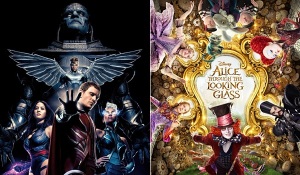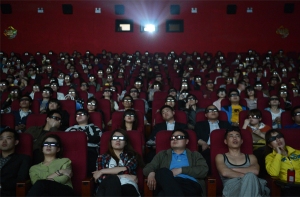
Recently, I've noticed a pattern developing in movie blockbusters. In the past couple years, movies like "The Brothers Grimsby," "Hardcore Henry," "Rachet & Clank," "Demolition," "Aloha," "In The Heart Of The Sea" and "The Last Witch Hunter" all under-performed at the box office, while films like "Star Wars: Episode VII - The Force Awakens," "Zootopia," "Inside Out," "Deadpool" and "Captain America: Civil War" have made far more at the box office than anyone expected, especially films like "Zootopia" which has made over $336 million in the United States, $993 million worldwide.
Normally, films like "Hardcore Henry" or "The Brothers Grismby" would have been number one at the box office on their opening weekends, due to gimmicky filmmaking concepts and lots of ultra violence, or well established actors in leading roles like Sasha Barha Cohen. Sometimes it can be associated with poor timing, like in the case of "In The Heart Of The Sea" coming out so close to "Star Wars," but even then the numbers were still poor, grossing less than $35 million on its opening weekend.
There could be a number reasons why this is happening, but I have noticed a correlation between the failure of smaller blockbusters and the success of others - Rotten Tomatoes.
To give you an idea, here are some of the scores of these recent box office flops - "Hardcore Henry" now holds a 48%, "In The Heart Of The Sea" has 42%, "Aloha" maintains a 20% and "Demoliton" comes in at 50%. All considered flops and failures by Rotten Tomatoes standards.
Now here is some of the scores for recent successes - "Star Wars" still has 92%, "Inside Out" and "Zootopia" both bolsters a 98%, and even "Deadpool" holds strong at 83%.
Based off of this information, if a blockbuster scores better on Rotten Tomatoes, then it is more likely to succeed at the box office, no matter what time of year it comes out. And the opposite also seems to be true as well - the lower a film scores on Rotten Tomatoes, the less likely it will do well at the box office.

Take one of the most recent weekends for example, which saw the release of two blockbusters - "X-Men: Apocalypse" and "Alice Through The Looking Glass." Both come from franchises that have previously proven to be financially successful and have some pretty big name stars, including Jennifer Lawrence, Michael Fassbender and Johnny Depp. Yet it was the mutant based action film that far exceeded the numbers of the adaptation of Lewis Carroll's work, with "X-Men: Apocalypse" bringing in $65.8 million and "Alice" only managing $26.9 million. It should also be noted the recent "X-Men" movie holds a 48% on Rotten Tomatoes, while "Alice" has a 29%.
Not very great scores for either film, but both are new and everyone has seemingly already seen "Captain America: Civil War" and those who were interested in "The Angry Birds Movie" has went to it already, those two were the best options for Memorial Day weekend.
But once again, the higher rated film on Rotten Tomatoes outgrossed the lower rated one.
Of course, this isn't always the case. There have been times where a lower rated film on Rotten Tomatoes outgrosses the higher one, with the biggest recent example being "Pitch Perfect 2" out-performing "Mad Max: Fury Road" on its opening weekend, even though the film many critics said was the best film of 2015 was nearly 20% ahead of the Anna Kendrick/Rebel Wilson sequel. This is by no means a perfect system, but then again there have been plenty of terribly rated films in the past that were box office juggernauts (I'm looking at you, any film directed by Michael Bay).
So, how is this happening? In the past, people have researched which film they will see over the weekend from home, but are unsure of how they'll like the film and are taking a risk by possibly going to see a movie they won't enjoy. But now we have smart phones that we have with us all the time. We can go to the movie theaters without deciding what to see in advanced, and pick which movie sounds the best while driving over using our phones.
For people who are undecided on which movie to see, they might turn to Rotten Tomatoes, where they can not only read what other people have said about the movie, from both critics and normal people sharing their thoughts, but they can also see those thoughts summarized into a nice little percentage that can be compared with other movies. And it seems we are now at the point where audiences are more likely to go to the highest rated new blockbuster.

Let's say that you wanted to go to the movies this last weekend, and you weren't a die-hard fan of the X-Men or the works of Lewis Carroll, but you had already seen "Captain America: Civil War" and "The Jungle Book." Would you wing it and randomly pick one of the two new films and hope that you picked the better one, or would you look up how both films are scoring online and go with the movie that is doing better?
I say this because it is similar to my routine of checking out the newest films, although I will do it more often than most other people because I'm obsessed with cinema. Usually every Friday, I will see how each of the newest blockbusters are scoring on Rotten Tomatoes to see if there are any films worth going to see. Because sometimes I won't be interested in seeing a blockbuster based on the trailer and info I've been given about the film, but it will score well on Rotten Tomatoes, like "Zootopia," and I'll be convinced to go see it in theaters.
I can guarantee you that I'm not the only movie-goer that does this. It is safe to say that Rotten Tomatoes has not only changed how we critique films, but also how well a film does at the box office.

Do you think the reason "Terminator: Genisys" never got number one at the box office during its time in theaters was because of competition? Possibly, but another big contributing factor was its low 26% on Rotten Tomatoes. By that point, films like "Jurassic World" and "Inside Out" had been in theaters for a while, so "Genisys" shouldn't have had much in the way of competition. Yet it got fifth on its opening weekend, losing to "Inside Out," "Jurassic World," "Ted 2" and "Max." Not "Mad Max: Fury Road," just "Max," about a dog that was in the army.
We live in a world now where the newest Arnold Schwarzenegger film can be outgrossed by the "American Sniper" of dog movies.
So, with Rotten Tomatoes seemingly having a big influence on how well movies do at the box office, the question is whether this is a good thing or a bad thing? I believe it is a little bit of both.
The bad thing Rotten Tomatoes influence is that it can over-hype some of the newest films. Take "Zootopia" for example, with its 98% and overglowing reviews. It is amazing that an animated film can be enjoyable to watch for so many people. But then step back a bit and think what that 98% means. Rotten Tomatoes is saying that "Zootopia" is a better film to watch than any film with a lower score than it.
And here is a list of movies that have a lower score than "Zootopia" - "Pulp Fiction," "Forrest Gump," "Fargo," "Terminator 2: Judgment Day," "Jurassic Park," "The Exorcist," "Die Hard," "The Hunt For Red October" and every single Indiana Jones movie.

Now I'm not saying "Zootopia" was a bad experience, but a better film than "Fargo" and "Raiders Of The Lost Ark"? Not even close. It seems like people got so excited about the unique animation and setting that they forgot its just a simple buddy-cop movie.
Part of this could be due to when these films came out. All the films I just mentioned were released long before Rotten Tomatoes was ever around (with the exception of "Indiana Jones and the Kingdom of the Crystal Skull" but we don't talk about that one), so people have had a longer time to think about these movies, as well as offer up contrary opinions. But with movies like "Zootopia" and "Inside Out," we haven't had nearly as much time to think of the negatives. We were so blown away by their creativity and imagination that we don't realize if the film will hold up years from now.
In other words, Rotten Tomatoes is focusing on the present and what people want now. If a movie was released a long time ago, it will naturally score a much lower rating. They're less concerned whether a film will be classic.
Personally, I don't listen to Rotten Tomatoes when it comes to classic films that is from 1995 or older, around the time the internet came into power. Reviews for those types of films tend to be either biased or far fewer. For example, one of my favorite guilty pleasures, "King Kong vs. Godzilla," only has a 33% on Rotten Tomatoes, with only 12 overall reviews. Whereas a current film like "Captain America: Civil War" has 310 reviews, giving it an overall score of 90%. Unless it's an undisputed classic, like "Citizen Kane" or "Casablanca" the further you go back in film history, the less you'll see of it on Rotten Tomatoes.
As for the benefits of Rotten Tomatoes influence, we now live in a world where film critics have a big say about which movies we go see. Critics have always had somewhat of an influence on what we watch, but only to those who search for critical analysis. To people who care about what the critics have to say about any particular movie. But with Rotten Tomatoes, the general film-going audience can get the idea of what critics are saying, whether they know it or not. Some people might only be interested in a movies' percentage, but they're also listening to what critics and others have said.
We can now finally listen to "The Critic" thanks to Rotten Tomatoes. "If the movie stinks, just don't go."
Overall, I'm more than happy to say that Rotten Tomatoes has changed the way people use film criticism. The whole point of critiquing a movie is not just to share your thoughts and opinions with others, but also to offer others with a better idea what films to watch and what to avoid. To give filmmakers, both current ones and aspiring ones, a better understanding of what it takes to make a film that resonates with audiences and will last beyond our lifetime. It is nice to see film criticism being taken as more than just angry typing and obsessed fans, but as a community full of passionate people who love what they do.
To see that community having an influence on what films people end up seeing is wonderful to witness.

No comments:
Post a Comment